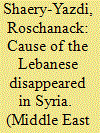|
|
|
Sort Order |
|
|
|
Items / Page
|
|
|
|
|
|
|
| Srl | Item |
| 1 |
ID:
172364


|
|
|
|
|
| Summary/Abstract |
In 1989 SOLIDE, a grass root movement from within the right wing Christian opposition to the Syrian military security emerged in order to campaign for the recovery of the disappeared. Drawing on oral history, interviews, fieldwork at SOLIDE's protest tent in downtown Beirut, and documentary analysis, I trace the genealogy and politics of SOLIDE's activism from the late 1980s to the present, showing that SOLIDE's activism underwent profound changes in response to Lebanese political developments. Beginning as an avowedly political campaign, in the aftermath of the war it turned into a human rights-focused NGO, a shift that was only possible because of an alliance with a group of the mothers of the disappeared; gender stereotyping enabled SOLIDE to present itself as fundamentally apolitical. With the establishment of a protest tent in downtown Beirut in 2005, in the period after the Syrian withdrawal until the end of its sit-in in 2015, SOLIDE took on the characteristics of a social movement. Analysis of the various phases of activism demonstrates that in Lebanon the boundaries between humanitarianism, often of religious inspiration, and human rights activism, supposedly secular, are porous, as too the boundary between party-political activism and civil society.
|
|
|
|
|
|
|
|
|
|
|
|
|
|
|
|
| 2 |
ID:
186066


|
|
|
|
|
| Summary/Abstract |
In 2011, the Syrian uprising rapidly escalated into a large-scale, complex, multi-dimensional civil war. Over a period of six years, the violence spread and became more intense, hundreds of thousands of people were killed, and the economic infrastructure and civic life of the region were devastated. The resultant fragmentation of Syrian territory was accompanied by the large-scale internal and external displacement of the population. Local activists, civil society members, and ordinary citizens have engaged in various practices to expose the violence. Such practices range from the uploading of videos to the internet and social media discussions, to more organized forms of activism, such as the creation of NGOs and the proper, systematic documentation of events. Since 2011, and in particular with the rise of ISIS, academics, policy makers, and the global media have taken a keen interest in the spectacle of violence in Syria.
|
|
|
|
|
|
|
|
|
|
|
|
|
|
|
|
| 3 |
ID:
183501


|
|
|
|
|
| Summary/Abstract |
During almost three decades of Syrian army presence in Lebanon, the Syrian military security in collaboration with local militia leaders and with the blessing of many postwar politicians abducted and transferred hundreds of Lebanese and Palestinians illegally across the border to Syria. Based on interviews with the relatives of these victims and on participant observation at the permanent sit-in at the protest tent in downtown Beirut where they regularly gathered, I discuss the search practices of these families since the early 1980s. I throw light on several of their activities to resist the political, legal, and public erasure of these disappeared. I suggest that relatives have acted as ‘informal lawyers’ of the absentees to protect them from being blamed for their own abductions. Furthermore, I argue that after the Syrian army withdrawal in 2005 there has been a clear transition from what Thomas Blom Hansen calls the de facto sovereignty of transnational shadow networks (such as in this case of Syrian and Lebanese military security) to the de facto sovereignty of global humanitarian and human rights regimes. I claim that members of both of these transnational networks engage in a set of discourses and practices to decide over the life and death of these victims.
|
|
|
|
|
|
|
|
|
|
|
|
|
|
|
|
|
|
|
|
|